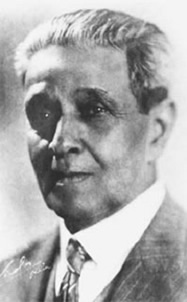Ernesto Nazareth
| Ernesto Nazareth | |
|---|---|

Ernesto Júlio de Nazareth
|
|
| Background information | |
| Born |
March 20, 1863 Empire of Brazil |
| Died | February 5, 1934 (aged 70) |
| Genres | Classical |
| Occupation(s) | Composer |
| Instruments | Piano |
Ernesto Júlio de Nazareth (March 20, 1863 – February 5, 1934) was a Brazilian composer and pianist, especially noted for his creative Maxixe and Choro compositions. Influenced by African rhythms and many musical styles like the Lundu and the Choro, he never fully accepted this influence, refusing to give popular names to his compositions. A musician of classical training, he classified his music as "Brazilian tangos", since the Argentine tango and dances were considered fashionable at the time. His piano repertoire is now part of the teaching programs of both classical and popular styles, as Nazareth once served at the boundary between these two worlds.
Ernesto Nazareth was born in Rio de Janeiro, one of five children. His mother, Carolina da Cunha gave him his first piano lessons. At the age of ten, after his mother's death, he continued his piano studies with Eduardo Moreira and Charles Lucien Lambert.
Strongly influenced by Chopin, Nazareth published his first composition Você Bem Sabe (1877), at age 14. At this time, he began his professional career playing in cafes, balls, society parties and in the waiting rooms of movie theaters. In 1893, Casa Vieira Machado published his famous tango Brejeiro.
In 1879, he wrote his first tango Cruz perigo. In 1880, at the age of 17, he made his first public appearance at the Mozart Club. The following year, he composed the tango Não caio n'outra, his first great success, with several reprints. In 1885, he performed in concerts in different clubs of the court. In 1893, Casa Vieira Machado launched a new catalogue of his compositions, including the tango Brejeiro, which achieved national and even international success, in that the Republican Guard band of Paris began to include it in their repertoire, coming even to record it.
His first concert as a pianist took place in 1898. The following year he prepared the first edition of the tango Turuna. In 1905, he had his first work, Brejeiro, recorded by singer Mario Pinheiro with the title O sertanejo enamorado with lyrics by Catulo da Paixão Cearense. Meanwhile, the "Casa Édison" marching band recorded his tango Brushed, which became quite successful. In 1907 Ernesto Nazareth was appointed third book-keeper of the National Treasury, a position that he did not occupy for not mastering the English language. In 1908, he began working as a pianist at the Mozart Club.
...
Wikipedia
